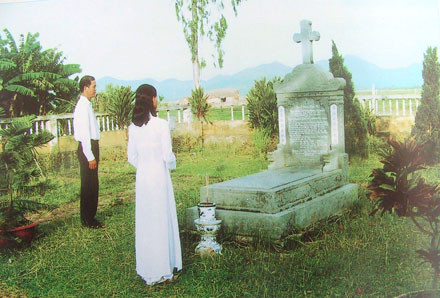Nguyen Truong To - The great reformer
(Baonghean) -Currently, Hung Nguyen district and Nghe An province are looking forward to commemorating the 140th anniversary of the death of the famous Nguyen Truong To (which will be solemnly celebrated on November 22, in Hung Nguyen district - his hometown). So what are his reform contents?
Nguyen Truong To, born in 1828 in a Catholic family in Bui Chu village, Hai Do commune, Hung Nguyen prefecture (now Hung Trung commune, Hung Nguyen district). He was born and raised in the context of the Vietnamese feudal regime facing a serious crisis; peasant uprisings broke out everywhere, the economy, culture, military, and diplomacy were at a standstill; foreign capitalist and imperialist forces were eyeing to invade Vietnam. The Nguyen Dynasty of Tu Duc dynasty was confused in its domestic and foreign policies. In that situation, Nguyen Truong To - a person well-versed in Confucianism, famous for his outstanding talent and profound wisdom, made 58 petitions. Some important petitions include: In 1863, he sent 2 copies "Discussing the major situations in the world" and "Discussing religious freedom"; in 1864: "Plan to maintain the new peace treaty"; In 1865, two copies were published: "On the purchase and construction of motorboats" and "Plan for the exploitation of national resources". In 1866, "On practical learning"....

With such reports, he both outlined and specified the contents that needed to be done and the methods of implementation. For example, “Eight urgent tasks” was considered a great designer. The contents of the eight tasks included: urgently amending the military; uniting provinces to reduce the number of officials and trainees; raising finances by imposing luxury taxes; amending academics, focusing on practicality; adjusting land taxes; revising borders; understanding the population; establishing orphanages and poorhouses. Not only stating the main direction, Nguyen Truong To also pointed out specific tasks such as in the field of Culture and Society. He suggested: valuing writing, banning the circulation of myths, emphasizing the role of culture and education in reform; providing relief to the poor; amending customs, habits, food, accommodation, and clothing; combating extravagance, waste, gambling, taxing cigarettes, singing, and entertainment; against superstition... Or in terms of diplomacy, he advocated peace with France, temporarily ceding the French territory to establish diplomacy with other countries in order to "use them to prevent, divide, oppress and take advantage of them to fight the enemy".
All of Nguyen Truong To's strategies stemmed from a unique way of thinking that was more far-reaching than his contemporaries. First of all, he placed Vietnamese history in the historical process of the world. If we want to strengthen our country, we must modernize to the world's level. At the same time, we should cherish the past but not just look back at the past.
As a person with a general vision, sometimes on the surface he seems to innovate but seems paradoxical to “innovation”. For example, in terms of improving the writing system, he advocated against Chinese characters and also did not support the National Language (Vietnamese according to the Latin alphabet used in the church at that time) but used “national language Han Tu” – that is, changing Chinese characters into Vietnamese characters like Japan and Korea were doing.
Cultural celebrity Nguyen Truong To was both sincere (he criticized himself for 3 “crimes”) and a resolute, courageous person who was knowledgeable in many fields: politics, diplomacy, economics, national defense, education and training; industry… He was not only good at theory but also knew how to practice them. His thinking was practical but highly generalizable, based on the ethics of respecting God and loving the country but was timeless, democratic and public.
Priest Vo Thanh Tam, who studied Nguyen Truong To's education, said: In terms of Chinese literature, he studied with four teachers (Nguyen Quoc Thu; Tu Giai, Cong Huu and retired district official Dia Linh); and as for Western studies, he was mainly self-taught. Nguyen Truong To's viewpoint on learning is expressed in the famous saying, "Learning practical things will bring practicality; learning trivial things will only bring trivial things; planting beans will bring beans, that is natural."
Tu Duc once told his courtiers: “Nguyen Truong To believed too much in his suggestion…why did he urge him so much when my old methods were already enough to control the country?” Pity Tu Duc, anger the weak and short-sighted king, if he had been humble, listened to the honest and wise words of the wise, the country could have avoided the disaster of French invasion - the Meiji Restoration style that Japan successfully practiced at the same time./.
Hoang Chinh
